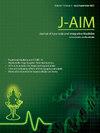Effects of self-acupressure on quality of life and abdominal pain severity among patients with inflammatory bowel disease: A randomized sham-controlled trial
IF 1.9
Q3 INTEGRATIVE & COMPLEMENTARY MEDICINE
引用次数: 0
Abstract
Background
Acupressure is being used by patients to relieve functional gastrointestinal disorders.
Objective
The impact of acupressure on quality of life (QoL) and pain has been shown in patients with both acute and chronic conditions. However, its effects on individuals with inflammatory bowel disease (IBD) remain uncertain. This trial aims to explore the potential effects of self-acupressure on QoL and abdominal pain severity in IBD patients.
Methods
This randomized sham-controlled trial involved 56 outpatients with IBD referred to the emergency department, who were randomly assigned to either an acupressure group or a sham group. All patients received standard care along with daily follow-up calls. Those in the acupressure group applied pressure at four specific points, while the sham group engaged in superficial self-touch at corresponding points. Both interventions occurred three times daily for four weeks. The quality of life was assessed using the IBDQ-9 questionnaire and a visual analog scale (VAS) at both baseline and endpoint.
Results
The mean IBDQ-9 score was significantly higher in the acupressure group compared to the sham group at the trial's end (P < 0.001). Likewise, the mean VAS score was notably lower in the acupressure group at the endpoint (P < 0.001). Additionally, the change in mean IBDQ-9 scores from baseline to endpoint favored the acupressure group significantly (P < 0.001), and the same significant difference was observed for the mean VAS score change (P < 0.001).
Conclusion
Daily follow-up-guided self-acupressure may improve quality of life and alleviate abdominal pain in IBD sufferers.
自我穴位按压对炎性肠病患者生活质量和腹痛严重程度的影响:一项随机假对照试验
背景:穴位按压正被患者用于缓解功能性胃肠疾病。目的探讨穴位按压对急性和慢性疾病患者生活质量(QoL)和疼痛的影响。然而,它对炎症性肠病(IBD)患者的影响仍不确定。本试验旨在探讨自我穴位按压对IBD患者生活质量和腹痛严重程度的潜在影响。方法:这项随机的假对照试验涉及56例IBD门诊患者,他们被随机分配到指压组或假组。所有的病人都接受了标准的治疗以及每天的随访电话。穴位按压组在四个特定的穴位上施加压力,而假手术组在相应的穴位上进行浅表自触。两种干预措施每天进行三次,持续四周。在基线和终点采用IBDQ-9问卷和视觉模拟量表(VAS)评估生活质量。结果穴位按压组IBDQ-9评分显著高于假手术组(P <;0.001)。同样,穴位按压组在终点的VAS平均评分明显较低(P <;0.001)。此外,从基线到终点,平均IBDQ-9评分的变化明显有利于指压组(P <;0.001),平均VAS评分变化也有同样的显著差异(P <;0.001)。结论每日随访引导下的自我穴位按压可改善IBD患者的生活质量,减轻腹痛。
本文章由计算机程序翻译,如有差异,请以英文原文为准。
求助全文
约1分钟内获得全文
求助全文
来源期刊

Journal of Ayurveda and Integrative Medicine
INTEGRATIVE & COMPLEMENTARY MEDICINE-
CiteScore
4.70
自引率
12.50%
发文量
136
审稿时长
30 weeks
 求助内容:
求助内容: 应助结果提醒方式:
应助结果提醒方式:


